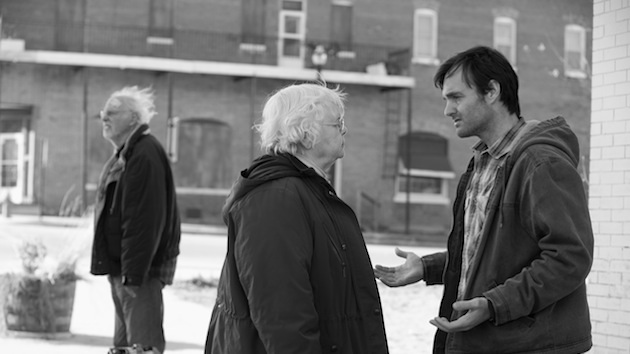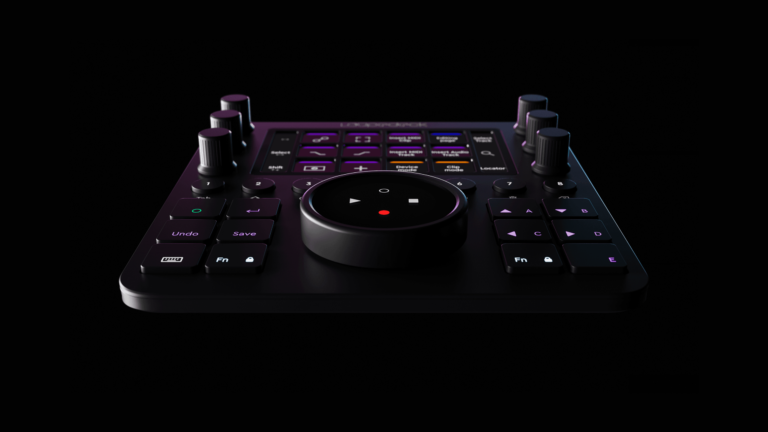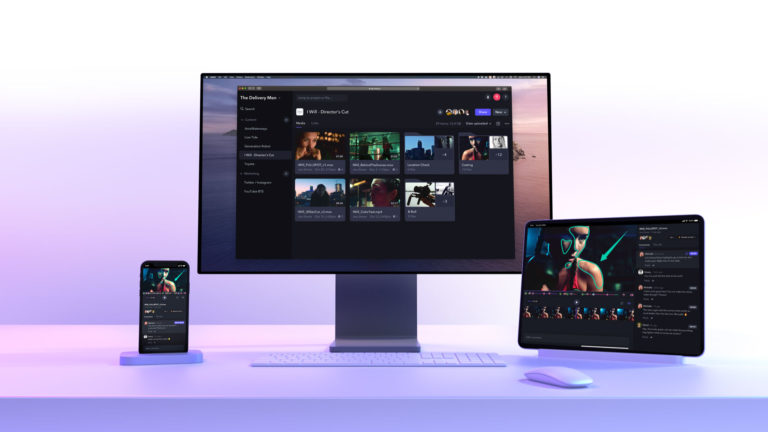Alexander Payne's Longtime Editor Helps the Director Go Digital in Black-and-White
In his latest film, director Alexander Payne has returned to About Schmidt country and the wide open spaces of his native Nebraska, this time in black-and-white. Nebraska, which opens on November 22, traces one man's quest—on foot, with his thirty-something son in tow—to claim the million dollars in prize money he believes he's won in another state. The grimly funny road movie stars Bruce Dern and SNL-alum Will Forte and was shot digitally with the ARRI Alexa, a first for Payne. It premiered at Cannes last May, where Dern won Best Actor for his performance and it will roll out this month and next at film festivals across the country. We spoke with Payne's longtime collaborator and editor, Kevin Tent, who cut the film on Avid Media Composer, about editing in black-and-white and the challenges of setting the right pace.
StudioDaily: Was the film shot in black-and-white or in color, like The Artist, and then converted to black-and-white before you began editing? And how did that influence the way you edited the film?
Kevin Tent: The color files coming out of the ARRI Alexa were converted on set by our DIT, so we were editing fully in black-and-white. I actually found it kind of interesting. I felt that you ended up focusing on faces a bit more. Without color, it seemed like your eye would gravitate and hold on the faces in the scene because there were less distractions around it.
Was it difficult matching gradations, tones and lighting effects from shot to shot difficult or did you fix all that in the DI anyway?
If we did have situations where we couldn't smooth it out in the edit, and we didn't have too many, yeah, we'd just let them do their magic in the DI. Skip Kimball, our colorist, did a marvelous job on the film.
Alexander Payne famously lets his actors call the shots, but did he do any storyboarding on this film? In the trailer, there are a lot of man-against-the-landscape shots that seem planned far in advance.
I don't think Alexander Payne has ever done a storyboard. He'd much rather be fluid on set and let the actors figure things out before he does the blocking for a scene. But yes, the film is nicely composed and he did think a lot about that ahead of time. It's shot simply, with a lot of tableaus and beautifully composed scenes that linger on a scenic long shot and keep the actors moving around within that larger frame.
Payne wants to let his actors shine, but the process of editing means you're constantly manipulating those performances for a desired effect. The Descendants, for example, had a lot more humor in it before it was excised in the final edit. Was a similar thing going on during this project?
Actually, in this film early on we were trying to force a bit more humor with the edit but we abandoned that idea, which I think was a wise thing to do. The humor is still there, and was there from the beginning in the script, but it's very subtle.
What was your biggest challenge?
I guess our biggest—and this is usually the case with all of Alexander's movies—is keeping the pace going. In order to let those performances evolve in real time, you have to let the audience have time with them so they can absorb them and each subtle change. And that right there creates challenges for your overall rhythms and pace of the movie. So that's the edit's biggest challenge, to keep those performances real and heartfelt and yet keep the whole picture moving along at a reasonable pace.
I read somewhere that the lead was originally offered to Jack Nicholson and not Bruce Dern. Did that casting choice affect how you approached the edit?
I actually don't think that's correct about Jack. When Alexander first gave me the script, which was when we were editing Sideways nine years ago, he mentioned Bruce Dern as his first choice. He said, "Wouldn't it be cool if we could do our own version of a Bogdanovich film with Bruce Dern in the lead?" I thought it was a great concept. It took a long time to finally get it made, however.

What else did you do to emphasize the grim, relentless determination motivating Dern as Woody Grant, himself a kind of play on Grant Wood's "American Gothic," drained of color?
Wow, that's great—I'll ask him about that. Maybe the writer was thinking about that painting when he wrote the script. The film certainly references the bleak landscapes in Andrew Wyeth's "Christina's World," but since Alexander's from Nebraska, most of that vision of these wide open, lonely spaces came right from him. In a way, it's a portrayal of America and its aging population contrasted against a younger generation, in this case Will Forte, who plays Grant's son. So the grimness comes in showing the decay that is happening in these isolated, small towns, from the buildings to the people living in them, but also how the younger generation is either ignoring or trying to come to terms with the old around them. Cinematographer Phedon Papamichael captured a lot of footage that conveyed that decay. One thing we did for Woody's character to create a sense of a man apart was we delayed his reaction shots. So when you'd normally make a cut to a reaction shot you usually keep it pretty tight, but we would randomly add beats and a delay. The effect for the audience would be, "Oh, is he even paying attention? Is he daydreaming?" We didn't do that all the time but just adding in those delays let Bruce Dern's character come across as just a little bit off. I still think it's pretty subtle but I also think it works somehow.
What else about Dern's performance surprised you or influenced you during the edit?
Well, he's just phenomenal in the film. He's so seasoned an actor. But he and I both worked diligently—he on camera and me in the edit suite—to make sure we kept clear of, as he called them, "Dernisms." He was very, very happy when he saw the first cut of the film because he didn't see any Dernisms in there. It was actually really touching to be in the room during that screening. He was with his daughter Laura and Alexander and I joined them. The first thing he said after he watched it was, "I've been in a lot of movies in my life but this is the first film he's been in." That's a pretty amazing thing to hear, especially since I think Coming Home is a pretty wonderful film, as are many of his others.

And what about Will Forte's performance? He's built his career on comedy, so this was a huge departure for him.
He's such a wonderful guy and compassionate person and that is exactly what comes through on film. His character is obviously stuck in a difficult situation, but he wants to do the best that he can by his dad. He just gave a lovely performance.
When the film premiered at Cannes, it wasn't exactly finished, and Payne has said he's been "tinkering" with it since then. What will be different when it opens in wide release?
There wasn't a whole lot we did structurally. If you saw the movie at Cannes and see it in November, you're not going to notice much at all. We tightened up in a few places and only lost a couple shots. The biggest difference is the music; it went to Cannes with "almost-final" tracks still in place.
What version of Media Composer did you cut the film on?
I think it was 5.5—we didn't have 6 yet because of the timing. I've since been working on 6.5 and I absolutely love it.
Were there any issues working with the ARRI raw files?
Not at all. It was completely seamless in the edit. We got our dailies and I was working on them in no time. It all worked great.
The Descendants, Payne's last film, was shot on film. Was this a real leap for him?
Phedon and I had both worked with digital footage before, but for sure it was kind of a big thing for Alexander to do. But he is so, so happy with how it looks.

How has your Media Composer workflow changed since working with Payne and what do you both value the most about it?
He cut his own short films back at UCLA, so he understands the process, but when I first showed him the Avid and what it could do, he was an instant convert. In fact, he'll often say, "God bless the Avid." We both love it and it blows me away with the sheer amount of footage it can handle. Both of us love the Script Tool. We often go back and look at two or three takes we think are the best in terms of performance and we'll often swap them out, say take 7 for take 2. If it doesn't improve the scene, we can always go back to the original. Script Tool just finds those takes so quickly.
What else in 5.5 helped you navigate the edit?
There are a lot of dissolves and driving montages so we did a fair amount of repositioning with the resizing tool to make sure that when we dissolve from a landscape shot there would be something in the negative part of that frame that would dissolve through. We moved things around a lot, actually, to get the timing right on dissolves. We also used the 3D warp tool a fair amount and did speed-ups and slow-downs. The Avid did a lot of heavy duty lifting.
What features inside MC 6.5 are you particularly excited about?
There's a lot I really like about it, and when I have to jump back to another version for something, I always miss those new tools. The timeline is so much cleaner in this version, making it easier to edit. Instead of 16 tracks filling up the screen, I can have 10. I haven't tried version 7 yet, but I'm really looking forward to it.
Any other Payne projects in the works?
He's pretty busy right now just getting Nebraska off the launch pad, but he said that in January, he's going to either start writing or working on a script he already has. He hasn't told me yet which it is.
Crafts: Editing
Sections: Creativity
Topics: Article Q&A Alexander Payne arri alexa arriraw avid media composer kevin tent nebraska (movie)
Did you enjoy this article? Sign up to receive the StudioDaily Fix eletter containing the latest stories, including news, videos, interviews, reviews and more.












One interesting thing about NEBRASKA, is the music by Mark Orton that was first written for SWEET LAND. The director of that film, Ali Selim, told me that Alexander picked the music without having seen the original film….with its Andrew Wyeth-like poster and images in it. It goes well with the heartland, cinematically.
Wow, that’s interesting. SWEET LAND is a pretty good movie itself.
Good interview – thanks!